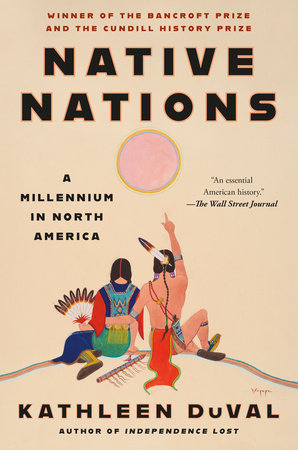Kathleen DuVal, Ph.D. ’01, won the 2025 Pulitzer Prize in History for her book Native Nations: A Millennium in North America (Random House, 2024). Prize winners were announced on May 5.

The announcement comes in addition to other prestigious awards DuVal has already received for the book, including the Bancroft Prize, the Cundill History Prize and the Mark Lynton History Prize.
[Editor's Note: This article was originally published by USDavis. Used with permission. All rights reserved.]
DuVal said the positive reception to the book was apparent immediately.
“I could tell that from the beginning, all the reviews that have come out have not only been positive, but they've really talked about the breadth of the book and the importance of the book, and that just felt really good,” said DuVal, a professor of history at University of North Carolina, Chapel Hill. “That's really what I wanted this book to be. This book has the biggest claims of any book I've ever written.”
Indeed, the Wall Street Journal called the book “an essential American history.” Publishers Weekly said it was prodigiously researched. Native Nations traces a thousand years of Native history, showing how tribes have adapted to challenges, including the arrival of Europeans, but also climate change and conflict.
Duval said her previous books and her teaching experience enabled her to paint such an expansive portrait.
“I couldn't have written this one first,” she said.
Her first book, The Native Ground: Indians and Colonists in the Heart of the Continent (University of Pennsylvania Press, 2006), was her dissertation at UC Davis. Originally from Arkansas, DuVal looked at colonization in that region. And then for Independence Lost: Lives on the Edge of the American Revolution (Random House, 2016), she examined that conflict through the eyes of the outsiders of colonial society, including Native Americans, slaves and women.
For Native Nations, she went through archives to research primary documents and oral histories. She also looked at how particular nations tell their own stories, in their own books and in their cultural centers and museums.
“One of the things that people said over and over is ‘we're still here. The most important thing you can say in this book is that Native nations are still around.’ So I really took that to heart.”
She added that she wanted to put the tragedies of Native histories in perspective.
“By putting those tragedies in a longer perspective, it makes it kind of even more amazing that Native nations survived. I don't try at all to minimize the tragedy, but I try to show the triumph over that tragedy. And I think that makes it even more of a heroic story than if we just talk about the tragedy.”
The Pulitzer Prizes honor outstanding achievement in journalism, arts and letters. Seth Rockman, Ph.D. ’99, was a finalist in the same category for his book, Plantation Goods: A Material History of American Slavery (University of Chicago, 2024). He is an associate professor of history at Brown University.
Next year, DuVal will take the year off from teaching and go to the National Humanities Center to focus on her next book, timed with the 250th anniversary of the American Revolution. “I'm writing a book about Yorktown in the American Revolution, looking at how different people experienced the war itself in a place where there was a huge amount of warfare right around people,” she said.
Help us tell the stories that could save Native languages and food traditions
At a critical moment for Indian Country, Native News Online is embarking on our most ambitious reporting project yet: "Cultivating Culture," a three-year investigation into two forces shaping Native community survival—food sovereignty and language revitalization.
The devastating impact of COVID-19 accelerated the loss of Native elders and with them, irreplaceable cultural knowledge. Yet across tribal communities, innovative leaders are fighting back, reclaiming traditional food systems and breathing new life into Native languages. These aren't just cultural preservation efforts—they're powerful pathways to community health, healing, and resilience.
Our dedicated reporting team will spend three years documenting these stories through on-the-ground reporting in 18 tribal communities, producing over 200 in-depth stories, 18 podcast episodes, and multimedia content that amplifies Indigenous voices. We'll show policymakers, funders, and allies how cultural restoration directly impacts physical and mental wellness while celebrating successful models of sovereignty and self-determination.
This isn't corporate media parachuting into Indian Country for a quick story. This is sustained, relationship-based journalism by Native reporters who understand these communities. It's "Warrior Journalism"—fearless reporting that serves the 5.5 million readers who depend on us for news that mainstream media often ignores.
We need your help right now. While we've secured partial funding, we're still $450,000 short of our three-year budget. Our immediate goal is $25,000 this month to keep this critical work moving forward—funding reporter salaries, travel to remote communities, photography, and the deep reporting these stories deserve.
Every dollar directly supports Indigenous journalists telling Indigenous stories. Whether it's $5 or $50, your contribution ensures these vital narratives of resilience, innovation, and hope don't disappear into silence.
 The stakes couldn't be higher. Native languages are being lost at an alarming rate. Food insecurity plagues many tribal communities. But solutions are emerging, and these stories need to be told.
The stakes couldn't be higher. Native languages are being lost at an alarming rate. Food insecurity plagues many tribal communities. But solutions are emerging, and these stories need to be told.
Support independent Native journalism. Fund the stories that matter.
Levi Rickert (Potawatomi), Editor & Publisher
